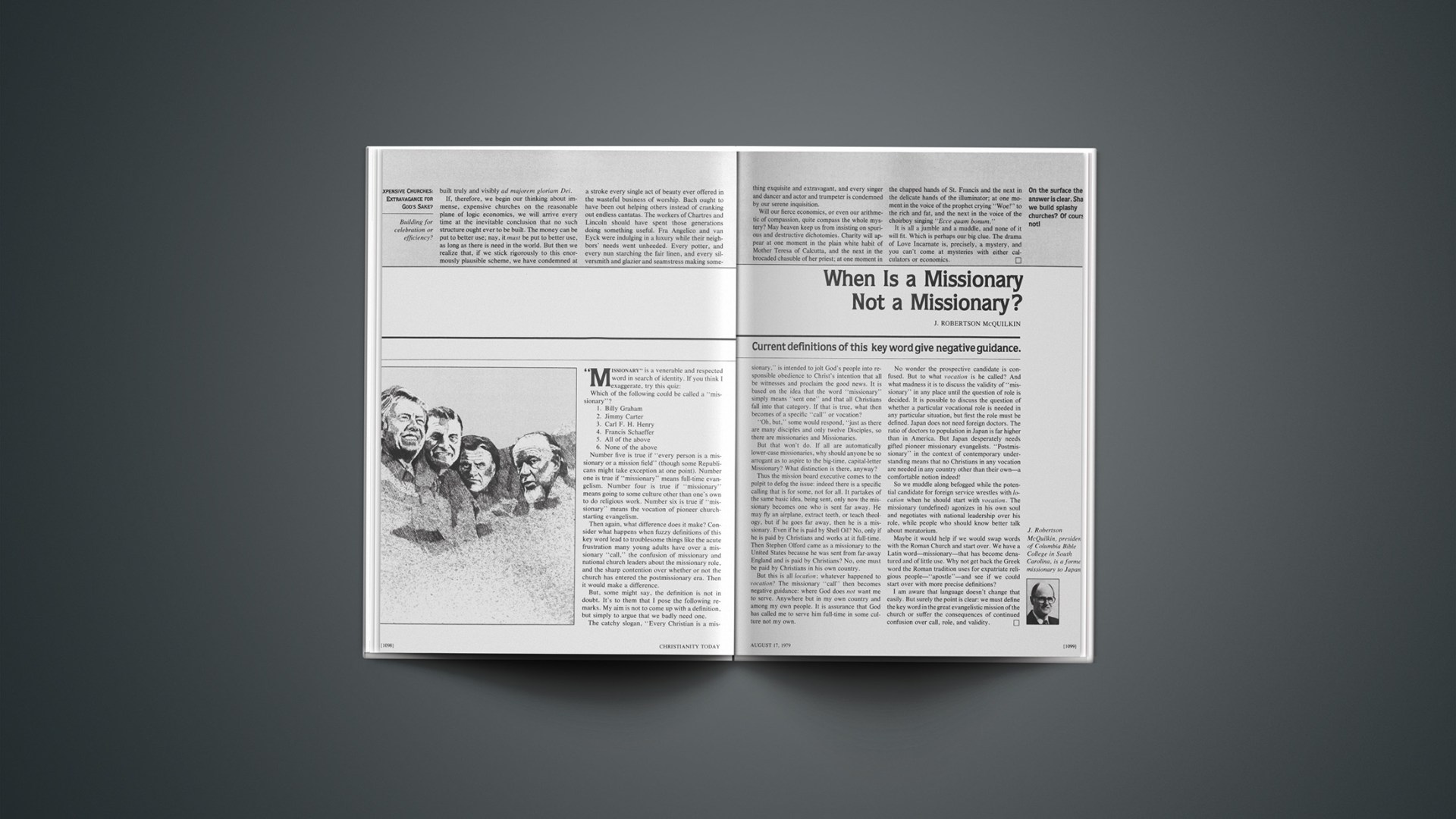Current definitions of this key word give negative guidance.
“Missionary” is a venerable and respected word in search of identity. If you think I exaggerate, try this quiz:
Which of the following could be called a “missionary”?
1. Billy Graham
2. Jimmy Carter
3. Carl F. H. Henry
4. Francis Schaeffer
5. All of the above
6. None of the above
Number five is true if “every person is a missionary or a mission field” (though some Republicans might take exception at one point). Number one is true if “missionary” means full-time evangelism. Number four is true if “missionary” means going to some culture other than one’s own to do religious work. Number six is true if “missionary” means the vocation of pioneer church-starting evangelism.
Then again, what difference does it make? Consider what happens when fuzzy definitions of this key word lead to troublesome things like the acute frustration many young adults have over a missionary “call,” the confusion of missionary and national church leaders about the missionary role, and the sharp contention over whether or not the church has entered the postmissionary era. Then it would make a difference.
But, some might say, the definition is not in doubt. It’s to them that I pose the following remarks. My aim is not to come up with a definition, but simply to argue that we badly need one.
The catchy slogan, “Every Christian is a missionary,” is intended to jolt God’s people into responsible obedience to Christ’s intention that all be witnesses and proclaim the good news. It is based on the idea that the word “missionary” simply means “sent one” and that all Christians fall into that category. If that is true, what then becomes of a specific “call” or vocation?
“Oh, but,” some would respond, “just as there are many disciples and only twelve Disciples, so there are missionaries and Missionaries.
But that won’t do. If all are automatically lower-case missionaries, why should anyone be so arrogant as to aspire to the big-time, capital-letter Missionary? What distinction is there, anyway?
Thus the mission board executive comes to the pulpit to defog the issue: indeed there is a specific calling that is for some, not for all. It partakes of the same basic idea, being sent, only now the missionary becomes one who is sent far away. He may fly an airplane, extract teeth, or teach theology, but if he goes far away, then he is a missionary. Even if he is paid by Shell Oil? No, only if he is paid by Christians and works at it full-time. Then Stephen Olford came as a missionary to the United States because he was sent from far-away England and is paid by Christians? No, one must be paid by Christians in his own country.
But this is all location; whatever happened to vocation? The missionary “call” then becomes negative guidance: where God does not want me to serve. Anywhere but in my own country and among my own people. It is assurance that God has called me to serve him full-time in some culture not my own.
No wonder the prospective candidate is confused. But to what vocation is he called? And what madness it is to discuss the validity of “missionary” in any place until the question of role is decided. It is possible to discuss the question of whether a particular vocational role is needed in any particular situation, but first the role must be defined. Japan does not need foreign doctors. The ratio of doctors to population in Japan is far higher than in America. But Japan desperately needs gifted pioneer missionary evangelists. “Postmissionary” in the context of contemporary understanding means that no Christians in any vocation are needed in any country other than their own—a comfortable notion indeed!
So we muddle along befogged while the potential candidate for foreign service wrestles with location when he should start with vocation. The missionary (undefined) agonizes in his own soul and negotiates with national leadership over his role, while people who should know better talk about moratorium.
Maybe it would help if we would swap words with the Roman Church and start over. We have a Latin word—missionary—that has become denatured and of little use. Why not get back the Greek word the Roman tradition uses for expatriate religious people—“apostle”—and see if we could start over with more precise definitions?
I am aware that language doesn’t change that easily. But surely the point is clear: we must define the key word in the great evangelistic mission of the church or suffer the consequences of continued confusion over call, role, and validity.
G. Douglas Young is founder and president of the Institute of Holy Land Studies in Jerusalem. He has lived there since 1963.










